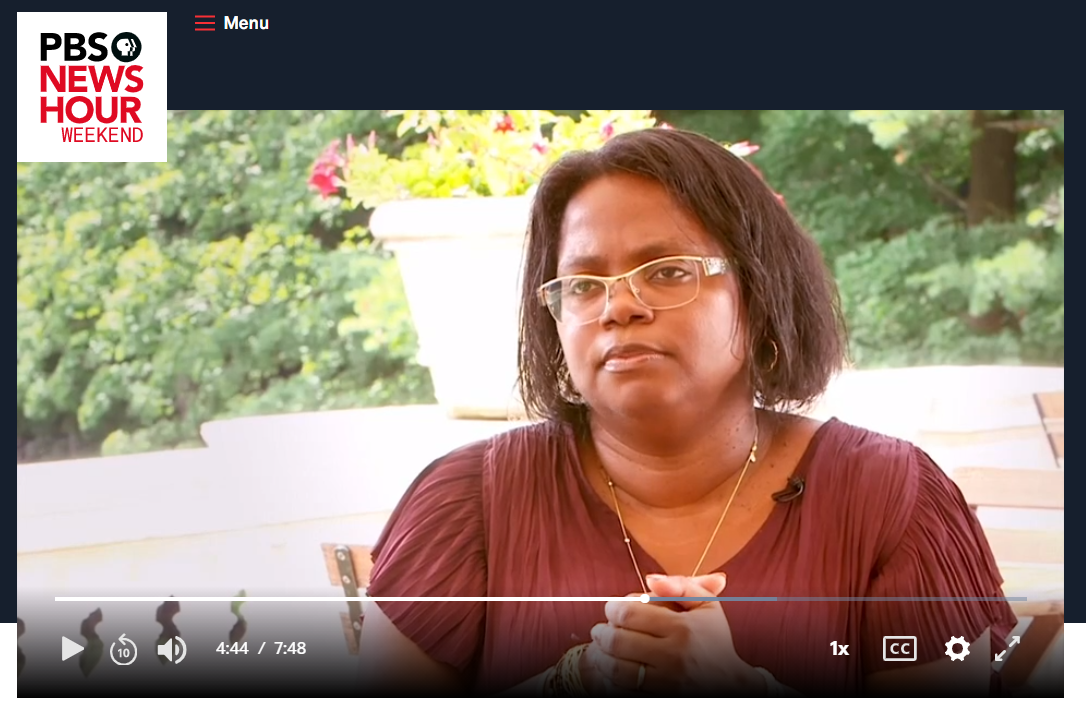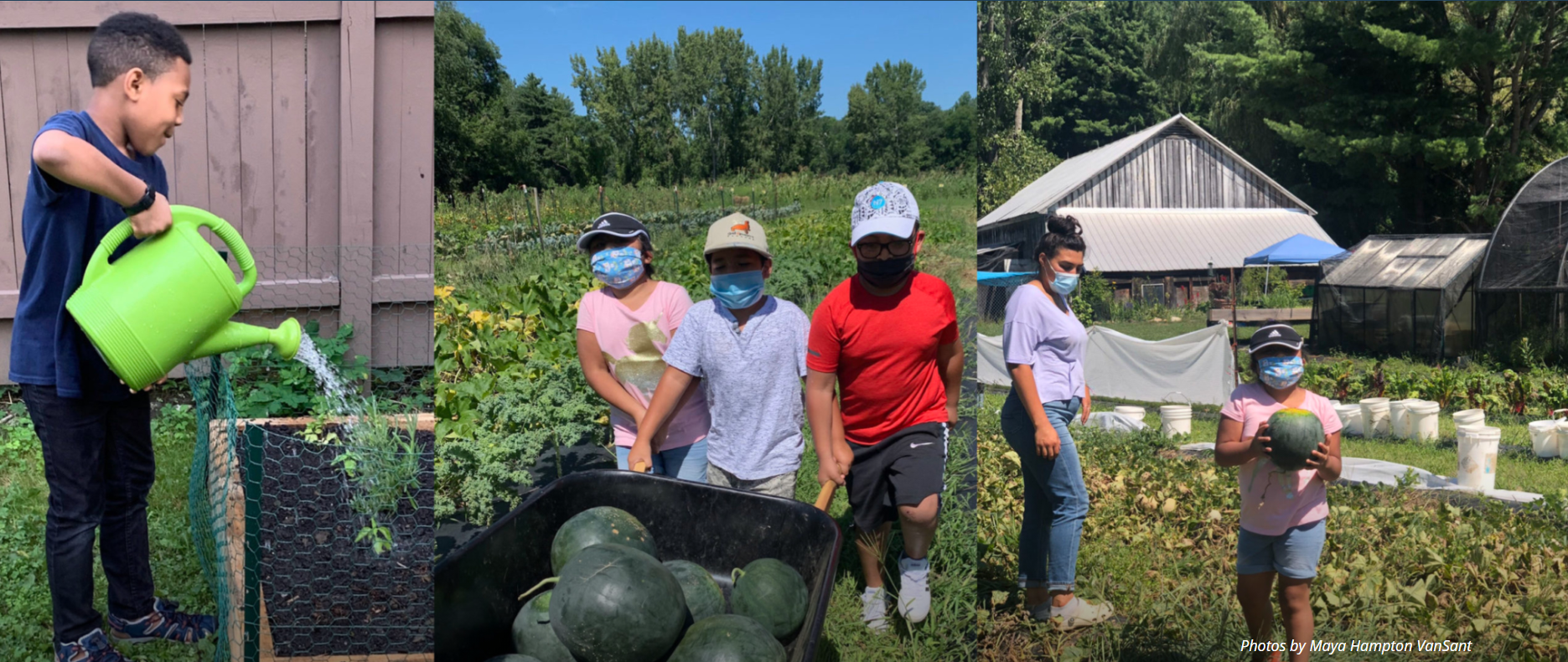|
By Zachary Green & Ivette Feliciano | PBS NewsHour
This summer, thousands of residents showed up for the Black Lives Matter protests in Great Barrington, Massachusetts -- a small town of less than 7,000 people. NewsHour Weekend’s Zachary Green, who grew up there, reports on how Black people in the progressive town are still facing racial discrimination. Featuring BRIDGE Founding Director and CEO, Gwendolyn VanSant, alongside other local racial justice leaders.
0 Comments
Kate Abbot | btw Berkshires
On a quiet, warm evening, Don’Jea Smith can pick tomatoes. She can feel the warm slender fruit in her hands and the way it will come away from the plant with a gentle lift. It’s new to her, the sharp, green and spiced scent of tomato plants, the feel of the earth and the hum of crickets. She has felt it stir and fill her. “The wind’s hitting differently now, because I have these plants,” she said. “I’d never gardened in my life. Now it’s something my partner and I can do.” She speaks confidence and gladness and a sense of strength. “I’m overwhelmed with so much joy and work ethic, my heart wants to fly,” she said. “I’m going on more walks — my own fear (of being out in the woods) is lessening. I’m so glad I’m getting a chance to build that connection with the land, that connection with my ancestors since we got here.” She has found that closeness and her garden through Multicultural Bridge. She is the executive assistant at Bridge and a recent graduate from the Massachusetts College of Liberal Arts in creative writing. She has joined Bridge this summer, and as she works with programs ranging from education to social justice, she has become involved in a new program in food sustainability that Bridge has grown in response to the pandemic, helping families to connect with local farms and grow their own harvests. “Covid-19 brought out the connection between the land, food … and equity,” said Bridge’s founding director, Gwendolyn VanSant. In embrace of W.E.B. Du Bois, Great Barrington names middle school after the civil rights icon9/4/2020 Deanna Pan | Boston Globe Following more than a decade of public strife, Great Barrington, a small idyllic town in the Berkshires, has finally embraced hometown hero W.E.B. Du Bois, the iconic civil rights activist, scholar, and founder of the NAACP.
At the end of a two-and-a-half-hour Zoom meeting — in which dozens testified, mostly in favor of the proposed change — the Berkshire Hills Regional School District committee voted unanimously Thursday evening to rename the local middle school in honor of Great Barrington’s perhaps best-known native son. Monument Valley Regional Middle School is now W.E.B. Du Bois Regional Middle School, a symbolic though important gesture to the local activists who toiled for years to educate the region about the early civil rights pioneer’s life and legacy. “To me, in this moment of ’Black Lives Matter,’ this was the action, right? We can put a lot of words up and hold signs, but this was a clear action that would stand for what I see as reparations in Great Barrington for past community hurts,” said Gwendolyn VanSant, CEO and founding director of BRIDGE, a Berkshire-based nonprofit that provides cultural literacy and competency training. Jim Levulis | WAMC
The Berkshire Hills Regional School District Committee voted unanimously on Thursday to rename Monument Valley Regional Middle School in Great Barrington the W.E.B. Du Bois Regional Middle School. "I'm really encouraged that we have not only decided to name the middle school after Du Bois, but we also have all of the permissions to erect a statue after Dr. Du Bois in Great Barrington," VanSant said. "So I feel like Great Barrington has finally embraced Dr. Du Bois." John Townes | Berkshire Trade and Commerce
Multicultural BRIDGE is launching a new initiative that expands its emphasis on economic and social justice into food security. The overall initiative is called Food Sovereignty and Sustainability. “It’s an exciting concept,” said Gwendolyn VanSant, CEO and co-founding director of Multicultural BRIDGE, which is based in Lee. “It’s an opportunity to help strengthen the local food system, give people more control over their food sources, and also support local farms and producers.” According to VanSant, the COVID crisis pushed the issue of food security to the forefront at BRIDGE. “Many families were already vulnerable, and with the COVID shutdown many lost their jobs,” she said. “So we intensified our activities to meet these urgent needs. We sought and received support to distribute food to vulnerable families.” While the program grew out of the COVID crisis, it evolved to become a long-term initiative beyond the current situation, explained VanSant. “We decided that beyond the COVID emergency we wanted to be more strategic and systemic about change, to help make the food system more equitable and work for more people,” she said. |
Archives
July 2024
Categories |
Contact Us |
Stay Connected
|



 RSS Feed
RSS Feed